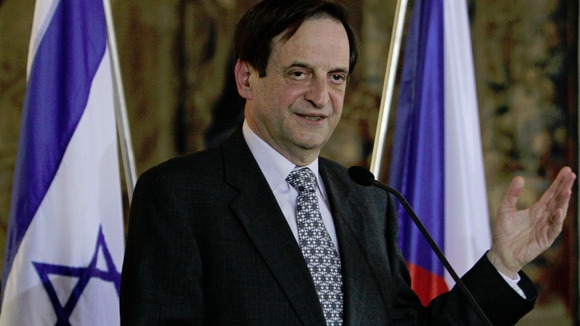Friday 14 September 2012 - 11:32
Story Code : 5631
Netanyahu deputy disagrees on setting Iran 'red line'
JERUSALEM, Sept 13 (Reuters) - Benjamin Netanyahu's deputy for intelligence and atomic affairs on Thursday broke with the Israeli prime minister's call for�Iran�to be confronted with a "red line" beyond which its disputed nuclear programme would face military attack.
In a broadcast interview, Deputy Prime Minister Dan Meridor appeared to side with the United States in balking at Netanyahu's repeated demand that it set Iran an ultimatum or risk seeing Israel launch region-rattling unilateral strikes.
Meridor's remarks also underscored debate within the leader's inner circle about potentially exacerbating the rift with Washington with a war that polls show most Israelis, including several senior security figures, would oppose.
"I don't want to set red lines or deadlines for myself," Meridor, one of several Netanyahu deputies who form the core of his security cabinet, told Israel's Army Radio when asked how much time remained before force against Iran should be used.
He called for international sanctions against Tehran to be intensified "so it understands that the price it is paying is mounting and that the only way to be rid of it is to stop the (nuclear) race, to arrive at an agreement, or an international understanding, that it is calling it quits".
"You always consider other options, for when everything else is exhausted. And I think that, for now, we have to continue with the pressure."
That echoed U.S. President Barack Obama, who seeks reelection in November and has tried to champion continued carrot-and-stick diplomacy with Iran while fending off charges by Republican rival Mitt Romney that he is soft on the Jewish state's security. Iran denies seeking nuclear weapons.
Obama, in an interview broadcast on Thursday with the U.S. Spanish-language network Telemundo, insisted he had set a red line for Iran, b ut offered no new specifics that would come close to meeting Netanyahu's demands for a tougher U.S. stance.
" I've stated repeatedly, public all y , that red line, and that is we're not going to accept Iran having a nuclear weapon - n ot only because it threatens Israel, not only because it could potentially threaten the United States," he said. "It c ould also fall into the hands of terrorists and it would trigger a nuclear arms race in the region."
Obama has pressed Netanyahu, with whom he has had a strained relationship, to allow more time for sanctions and diplomacy to work. But Obama has not r uled o ut military action against Iran if all else fails.
Netanyahu's office did not immediately respond to the Meridor interview, which followed statements by Israeli Defence Minister Ehud Barak and Foreign Minister Avigdor Lieberman urging that the disagreement with the United States be worked out more discreetly. ID:nL5E8KB9DC]
Though he did not mention Netanyahu by name, Meridor lamented what he called "the excessive chit-chat of recent months" in Israel about how and whether to tackle its arch-foe.
He spoke of the importance of U.S. diplomatic and defence assistance to Israel, and took a more moderate view of a nuclear-armed Iran than Netanyahu, who has likened that prospect to a second Holocaust.
"I don't want to speak in apocalyptic ... Holocaust terms," said Meridor, a veteran member of the ruling, rightist Likud party. "I think that we are strong and we will overcome the challenges, but this is a serious challenge."
Though widely assumed to have an nuclear arsenal, Israel's conventional forces are designed for border wars and many experts - including the top U.S. general, Martin Dempsey - have voiced doubt over the degree to which they could damage the distant, dispersed and well-defended Iranian nuclear facilities.
In comments that may have been designed to hint at the feasibility of a secret solo strike, Netanyahu on Thursday praised the Israeli military during a meeting with its high command.
"From time to time, operations have been necessitated, and they were carried out with exemplary success," he said. "Israel's citizens should know what I know - that there is someone to depend on. There is someone who is ready for the job."
The Iran Project is not responsible for the content of quoted articles.
# Tags











